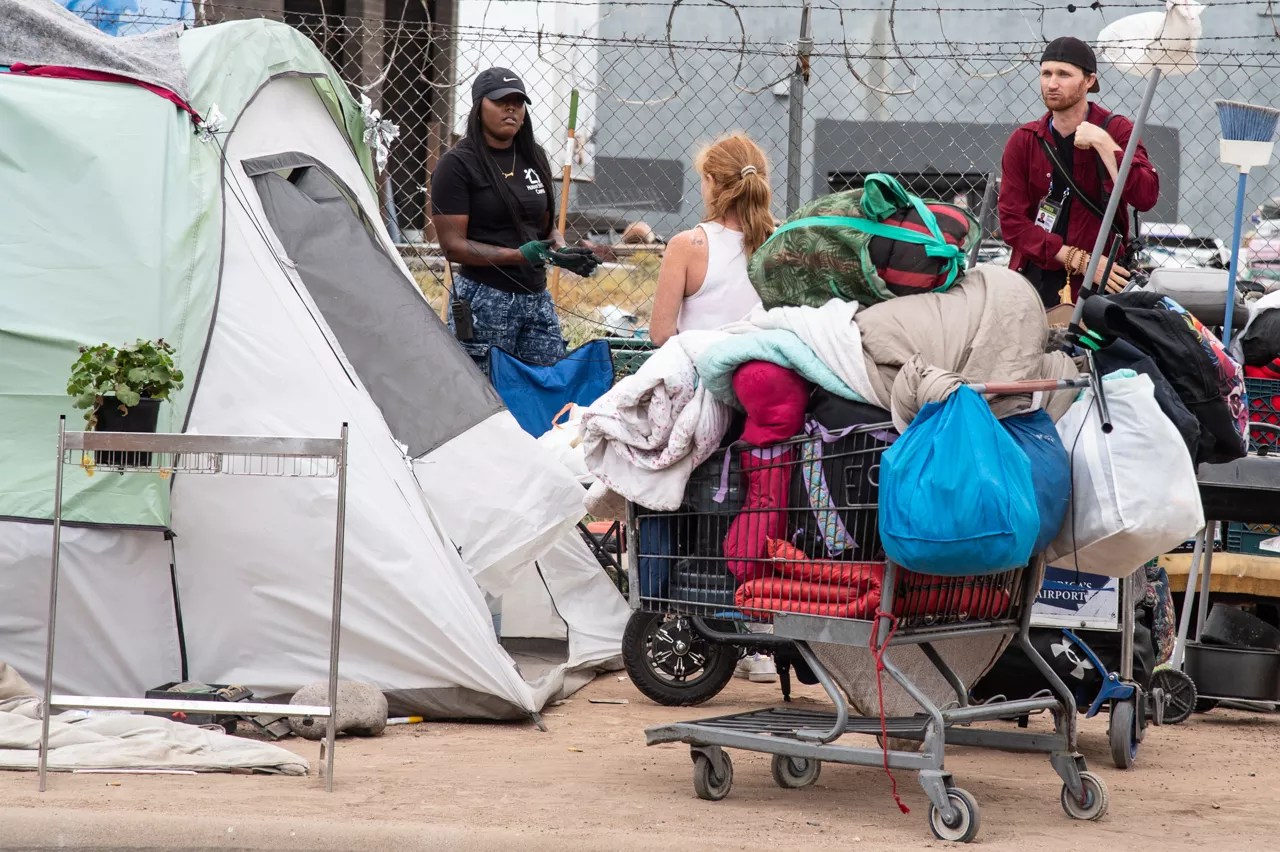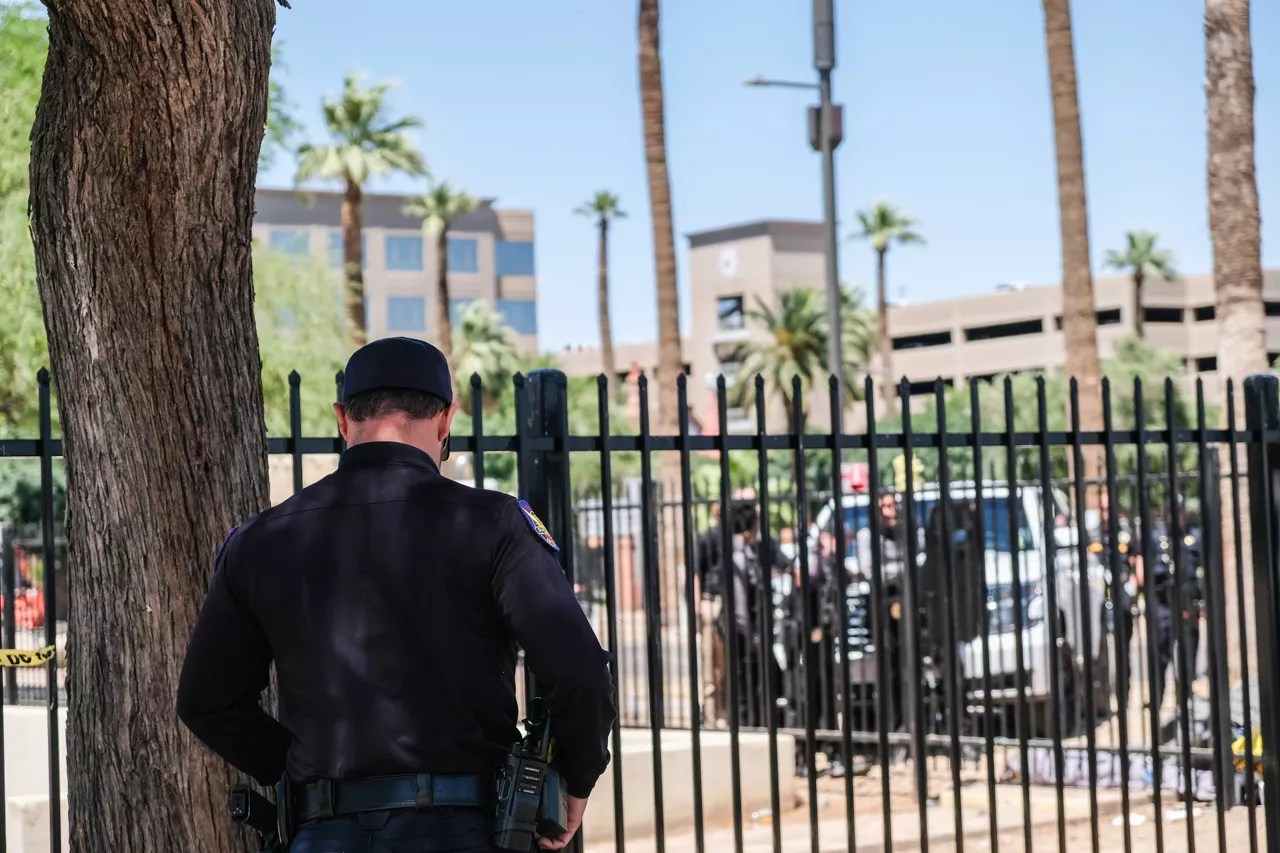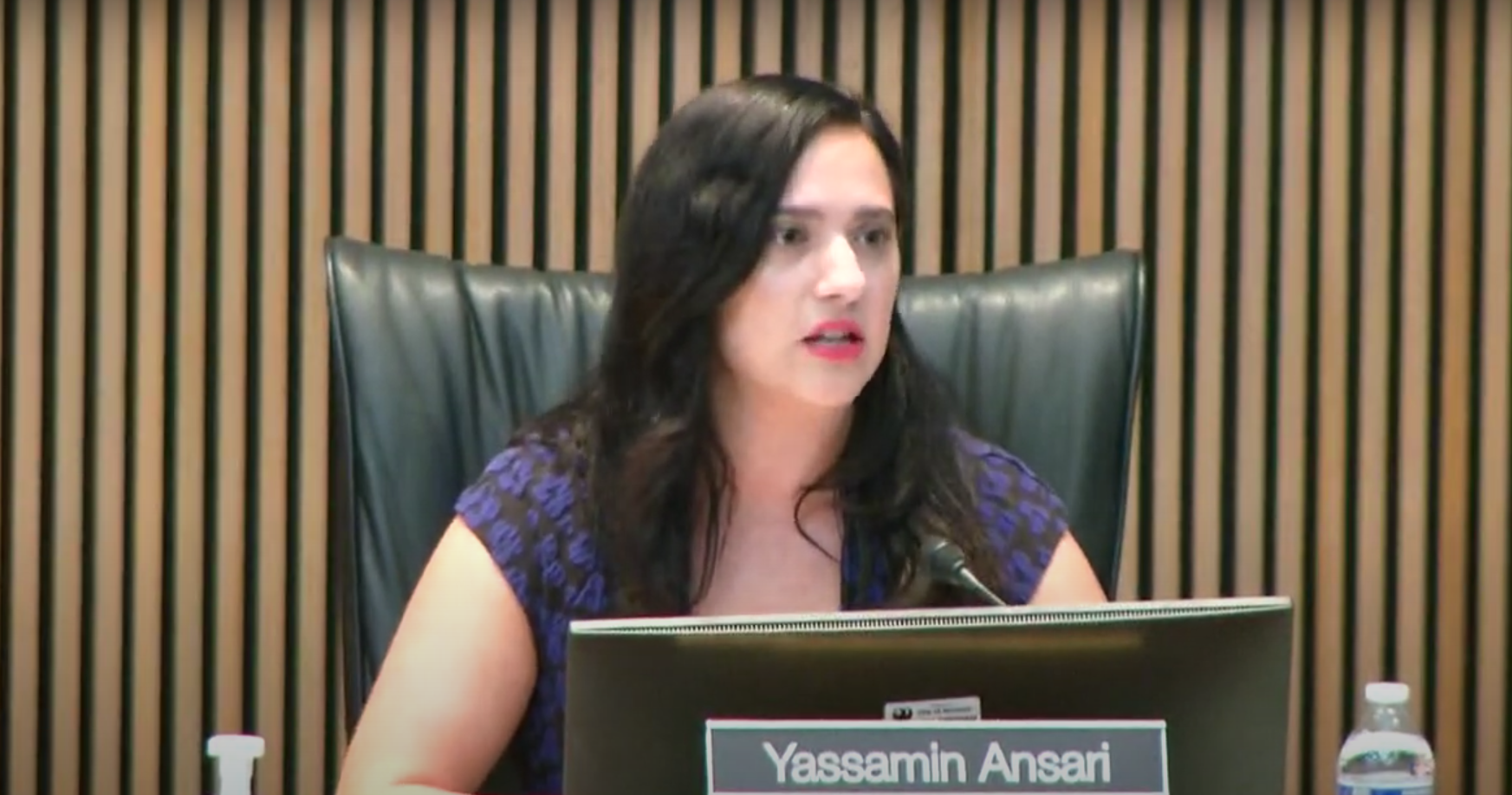
Katya Schwenk

Audio By Carbonatix
The tents and makeshift shelters of the Zone – Phoenix’s crowded downtown homeless encampment – must be cleared away by Nov. 4, a Maricopa County judge ruled last week.
Where the people who live in those tents will go is now left up to the city of Phoenix.
In his Sept. 20 ruling, Maricopa County Superior Court Judge Scott Blaney wrote that the city’s policies had allowed a “public nuisance” to develop in the Zone. He cited the human waste, trash, violence and increased illegal activity in the area as causing “irreparable harm” to the property owners and residents who brought the case to court.
“When it rains, the soil in and around the area is so soaked with urine and human feces that the rain intensifies the smell,” Blaney wrote in the ruling. “Business and property owners do not go outside when it rains because of the puddles full of human urine and feces. The proliferation of human excrement and half-eaten food causes an infestation of flies and other insects in the Zone.”
Kristin Couturier, a spokesperson for the city, said in a written statement that the city was disappointed by the ruling and is exploring legal options.

A tearful Zone resident stuffed her belongings into a shopping cart as a member of the press looked on in July. She was unable to take everything with her to a shelter and had to part with some possessions.
O’Hara Shipe
‘Necessary progress’
The city has been conducting sweeps in the Zone since May, clearing blocks one at a time and not allowing people to resettle them. So far, the city has carried out nine sweeps and has six more planned, with the next one set for Oct. 11.
Some activists have been troubled by the way the sweeps have been carried out. Elizabeth Venable, co-founder of the nonprofit Fund for Empowerment, said the sweeps tend to be conducted around 4 a.m. and with little, if any, advance notice given to residents.
According to Couturier, on Monday the city started notifying people living in the area of the next cleanup. Phoenix has been working block by block so that officials can offer adequate shelter to all people being cleared off the streets, she added. So far, the Phoenix Office of Homeless Solutions said that about 80% of people offered shelter in the sweeps have accepted it.
But Venable is wary that the figure may be deceptive, adding that shelter options offered are generally not a long-term solution. Jared Keenan, legal director of the American Civil Liberties Union of Arizona, said the organization is monitoring an alarming trend in which people who accept shelter leave shortly thereafter without their tents and other necessities, making it harder to survive back on the street. The ACLU of Arizona and the Fund for Empowerment sued the city in November citing allegations the city destroyed personal property in previous sweeps.
On Sept. 20, the Fund for Empowerment submitted a citizens’ petition to Phoenix City Council that, if approved, would require the city to track how long each person stays in the shelter and whether they leave voluntarily or involuntarily.
According to Couturier, fewer than 400 homeless people remain in the Zone as the city rushes to find solutions. However, Blaney’s ruling will require the city to speed up its timeline to meet the court’s November deadline. In July, officials said they needed nine months to finish clearing out the Zone.
“Asking the city to finish this work in six weeks is unrealistic and will ultimately be a disservice to the surrounding community,” Phoenix Vice Mayor Yassamin Ansari, whose District 7 includes the Zone, said in a written statement. “Despite that, I know we will make the necessary progress.”

Judge Scott Blaney’s ruling accused Phoenix of creating a public nuisance by transporting unsheltered people to the Zone.
Katya Schwenk
Court: Phoenix policies enabled the Zone to grow
There have always been homeless people living around the Zone, said Bill Morlan, who owns a business in the area. But around 2018, people started settling in a way he hadn’t seen before.
That year, the 9th U.S. Circuit Court of Appeals ruled that cities cannot enforce public camping laws against unsheltered people who do not have access to another temporary shelter.
In his ruling, Blaney said Phoenix did not correctly apply the 9th Circuit court’s decision. He also suggested the 9th Circuit’s decision has increased homelessness and urged the U.S. Supreme Court to review it.
Jared Keenan, legal director of the ACLU of Arizona, said the 9th Circuit ruling upholds the rights of homeless people and isn’t the cause of an increase in unsheltered people in Phoenix.
“The judge seems to believe that the 9th Circuit’s ruling upholding the constitutional right for unsheltered people is the problem that’s leading to homelessness, not the lack of long-term solutions by policymakers in Arizona and Phoenix,” Keenan told Phoenix New Times.
Blaney said the city’s policies led to more people relocating to the Zone, which grew the encampment’s population. He added that Phoenix police and organizations partnering with the city transported unsheltered people from around the city to the Human Services Campus in the heart of the Zone. While HSC helped those people receive assistance, it also resulted in a higher concentration of people settling in the area, the judge concluded.
Blaney’s ruling also accused the city of arbitrarily enforcing the law. Although the city claimed it did not have the power to remove tents in the area, it did order a business to remove dinosaur sculptures it put up to prevent homeless people from pitching tents nearby. In March, Blaney ruled that the sculptures had to stay in place until the “public nuisance” was ended.
The judge did credit the city for its goal of helping unsheltered people, but faulted Phoenix officials for doing so at the expense of property owners in the Zone.
“City personnel are clearly focused on an honorable goal – helping the homeless,” Blaney wrote. “But in their zeal to assist homeless individuals occupying the Zone, City personnel appear to be utterly indifferent to the plight of the City’s constituent property owners, their families, and small business owners that are attempting to make a living.”
Bill Morlan owns Electric Supply Inc., a business in the Zone. He is also the board chairman for Central Arizona Shelter Services, Arizona’s largest and longest-serving emergency shelter program.
Morlan told New Times that the concentration of people is increasing on the streets that have yet to be cleared.
On Madison Avenue, the tents have become so numerous that they fill the entire sidewalk. When Morlan walks from work to meetings at the Human Services Campus, he is forced to walk in the roadway.
“It’s definitely getting more compacted,” he said, adding that after being cleared off of one street, some people pick up their tents and move to a block that hasn’t been cleared. “There are going to be numerous people on those blocks who have moved two or three times because of prior cleanings.”

Vice Mayor Yassamin Ansari initially opposed the creation of a campground near the Zone but voted to approve it on Sept. 20.
City of Phoenix
Phoenix City Council approves new campground
Blaney’s ruling also pointed to a potential solution: structured campgrounds, or spaces off the street that allow homeless people to set up their tents in a confined area equipped with sanitary facilities, including bathrooms and showers.
The city has spent months planning for more campground spaces, with one South Phoenix plot falling through in June after methane was reportedly found in the soil.
On Sept. 20, Phoenix City Council voted to rezone a 5.5-acre plot of state-owned land on the corner of 15th Avenue and Jackson Street for a structured campground. The land will provide space for up to 200 tents and 300 people. The campground is expected to open as soon as October.
Venable said that while having showers and bathrooms will be an improvement for the area’s unsheltered people, she is concerned the conditions for eligibility may keep many people out of the campground, including behavioral or drug use issues.
“I think it’s too easy to say that people are not ready for shelters, when it may be the other way around: that shelters are not ready for them,” she said.
The unsheltered people who have declined to stay in the city’s shelters have done so for various reasons, including concerns about privacy and wanting to live with pets or partners.
Morlan said he can understand why some may be opposed to living in a shelter and hopes the new campground will be a good space for those people.
“You still have the privacy, you still have your little area. Which I think for a lot of people is going to be preferable to being in a dorm-style bed where the next person is 3 feet above you or 2 feet away from you,” he added.
In addition to clearing the right of way on the street and providing better access to bathroom and shower facilities for unhoused people, the campground will allow the city to maintain security on the premises. But several councilmembers have voiced concerns about security and policy, even as the measure was approved in a 9-0 vote.
In a discussion about the campground’s code of conduct on Sept. 20, Councilmember Ann O’Brien told city staff they should require people entering the campground to sign an agreement recognizing the rules.
The councilmember’s chief of staff, Derrik Rochwalik, told New Times that O’Brien is focused on increasing the number of people the city transfers out of the campground and into more stable environments, as opposed to how many people are moved out of the Zone.
Ansari, who has protested that her district has borne the brunt of the homelessness crisis in Phoenix, said during the council meeting that despite not agreeing with the location, she was “looking forward to making this outdoor space as humane as possible.” She also added that the campground needs to be a temporary solution, not a long-term one.
Councilmember Laura Pastor suggested placing a deed restriction on the campground that would require the city to use the area for different purposes after three years. It’s a measure the council could take up in the future.